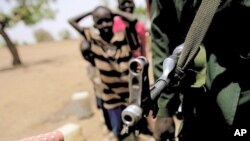Former South African president Thabo Mbeki has expressed confidence that Sudan and South Sudan will return to the negotiating table to get themselves out of what he calls "this state of war." Mbeki's high-level mediation panel is standing by to resume talks that broke off as fighting escalated.
Mbeki says he is sure the African Union mediation panel he heads will bring Sudan and South Sudan back together for talks.
A senior Sudanese lawmaker was earlier quoted as saying there was no room for diplomacy following the south's capture of the Heglig oil center. Member of Parliament Rabie Abdelati Obeid said the two countries are effectively at war.
Mbeki Tuesday brushed aside the lawmaker's comments, saying a resumption of negotiations is the only option. He conceded, however, that border hostilities have escalated to the highest point since the two countries split nine months ago. "It's very very unfortunate that they have got themselves in this state of war. It's very unfortunate. It doesn't help either country. There's not a problem between the two countries that cannot be resolved through negotiations," he said.
The African Union expressed grave concern late Tuesday at what it called the "prevailing logic of war." A press release called for immediate steps to ease tensions, and urged both countries to adopt a non-binding security centerline for the border.
A knowledgeable source on border issues says a centerline would place Heglig firmly in the north, although South Sudan claims it is disputed territory.
Mbeki says the key to resuming the talks is for South Sudan to end its occupation of Heglig, something the south's president, Salva Kiir, has said will not happen. "The statement I had originally heard from Khartoum was they were saying they would not engage in those negotiations until South Sudan pulls out of Heglig. That must happen fast. And it's only after that they will engage in negotiations," he said.
Mbeki says a solution must be found because neither country, nor the people facing starvation, could afford a protracted all-out war. "They've created a problem for both of themselves, but they've also created a problem for the region and for the continent as a whole, which is why the African Union was very quick to issue a public statement to indicate what the African continent believes needs to be done to end the fighting and to ensure that the two sides come back into a course of negotiations, which I'm sure will happen," he said.
Before the capture of Heglig, Mbeki's mediation panel had struggled in vain for months to find solutions to several bitter disputes that could not be settled before the south's independence.
With lower level talks deadlocked, the panel was hoping to bring together the two presidents, Sudan's Omar al-Bashir and South Sudan's Salva Kiir, for a face-to-face meeting early this month. But powerful interests in Khartoum strongly opposed the idea, and the plan collapsed as border hostilities escalated.
News
Despite Fighting, Mbeki Confident Sudan Talks Will Resume




